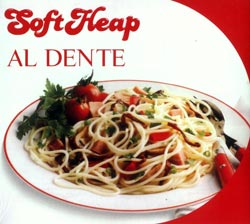
Welcome to the (soft) machine. Born kicking and screaming of Canterbury and improvisation, the vast collection of musicians hovering into and out of the Soft Machine camp were legion. Genre was spat out in all directions from those individuals involved, leaching resin through a distillation of prog yearning to be free, or, at the very least, freer. Soft Heap contained two former Softer alumni: bassist Hugh Hopper, who was already building up quite a rep for himself as the instrument's journeyman go-to guy; and saxophonist Elton Dean, a living electrical current whose fiery horns melted a number of eclectic jazz scenarios. Accompanying these two gents was the esteemed keyboardist Alan Gowen, a whiz-kid of no small prowess responsible for searing into memory forever his electric piano and battery of synths, and Pip Pyle, session drummer par excellence, more deft of hand than Jon Christensen but every bit as pliable. Far more out on a limb than the musician's significant others (Gilgamesh, National Health, Hatfield & the North, Isotope), Soft Heap went after jazz's flaccid innards, ripping them apart using rock's vivacity harnessed to the flexibility of improv.
The original quartet featuring Gowen was short-lived (at least on record), but Al Dente remains a corker of a testament, even eclipsing the band's eponymously-titled debut. Recorded live at the Phoenix Club in London in 1978, "Fara" starts things off in a most auspicious manner with an uncharacteristically smooth Dean solo, his dreamy lilt cascading atop Gowen's keyboards and Pyle's relatively restrained drumming; you'd be forgiven if you thought you'd stumbled on to a lost 50s bop date so slyly these four swing, but hold your breath. As soon as Gowen's electric piano establishes the airy motif of "Sleeping House" and Pyle's snares ripple outwardly, the performance space is lit with incumbent energy, Dean's sax paving the way for his cohorts to follow; it's a sparkling, incandescent piece that nearly veers into outright distortion so intense is the mel�e, but the combo keeps a tightness to their measure that deflects anarchy. That's not to say a piece such as "Remain So'" doesn't rock the foundations. Again, things begin solemnly with Dean's raspy tone making tentative introductions (who would have thought him to be such a "traditionalist" post the Machine grind?), yet soon all four bring on the sumptuous noise, Gowen's chocolate riffs allowing Pyle and Hopper to build solid metric foundations for Dean to build upon.
Live, this set must have been like pouring water on gasoline, as so a very appreciative (if small) audience attests to between numbers. Too bad that little remains of the band's further adventures (Gowen was to die tragically young of leukemia only a few years later); until whatever discoveries await us in the vaults, we have this wonderful coupling to buttress how the gregarious quartet briefly rose to the top of Heap.
Comments and Feedback:
|



